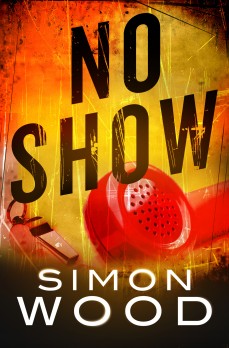Simon Wood's Web Hideout » No Show

No Show
Trade PaperbackAudiobook CD
Englishman Terry Sheffield has just arrived in San Francisco to start his new life with Sarah, the investigative journalist he married after a transatlantic love affair. But Sarah never shows up at the airport… When Terry reports his wife as missing, the police chalk it up to a new bride with cold feet. As a journalist, Sarah’s exposed her share of scandals, and Terry realizes that she’s not missing—she’s on the run. To find her before the killer does, Terry must explore the dark recesses of his new homeland and rely on the help of some new friends. But as his search brings him closer to finding Sarah, Terry realizes she’s very different from the woman he thought he married.
Read about the story behind the story in Abandoned.
The book is now available in paperback, CD, MP3, ebook and audio download.
Book Excerpt
Chapter 1
The fasten seatbelts sign went off with a ping. The passengers on the packed 747 from London rose to their feet, removing carry-on luggage from under their seats and the overhead bins. Everyone moved with the customary jet-lagged weariness, except for Terry Sheffield. The second the jumbo’s wheels touched the tarmac, he buzzed with excitement. He was here—San Francisco. His Plymouth Rock. A new life with Sarah awaited him on the other side of those aircraft doors. God, he couldn’t wait to see her. After six months of jumping through US Immigration’s hoops, he was free to begin his life in America with his wife.
They hadn’t seen each other since the honeymoon. They’d kept their relationship alive with regular phone calls. They’d accepted the harsh reality that it would be a struggle from the outset, but that didn’t mean they’d found it easy. It was the price of a transatlantic love affair.
None of that mattered now. He was here and Sarah was waiting and nothing could stop them.
The aircraft doors opened, and he filed off the plane with his fellow passengers. He slogged his way through the tedious process of collecting his backpack from baggage claim and submitting himself to the usual unwelcoming grilling by Immigration—this time a little extra hostile since he had a green card in hand. It was an agonizing forty minutes, not helped by the arrival of three other international flights only minutes apart. As he finally passed through Customs, he wished he could have brought a bouquet of flowers through with him, but bureaucracy won every time. Sarah would have to make do with just him. Wasn’t that gift enough? He smiled when he thought about using that line on her.
Terry followed the signs for the exit and entered the crowded arrivals lounge. Hundreds of people eager to meet a friend or loved one packed the large area. Their excited voices echoed off the walls as each new face stepped through the doors. He couldn’t contain his excitement and had no control over the dopey grin he put on for the world to see. He scanned the sea of faces for Sarah. He expected her face to jump out, but he saw nothing but wall-to-wall strangers. He slowed his pace and took a longer and more careful look for Sarah, but he still didn’t see her. She wasn’t there.
Her no-show was a punch in the gut. He couldn’t believe she wasn’t here on time. If the situation were reversed, he would have been camped out in the arrivals lounge for hours.
He was overreacting. It wasn’t a big deal. A traffic holdup was no doubt responsible. He knew from his previous visits that Bay Area traffic was a drag at the best of times, especially with the bridge construction delays. She was probably caught up in it somewhere. That was reality, but he wasn’t interested in reality. He wanted illusion. Today was meant to be flawless—the ending to a sappy Hollywood movie. Her lateness had killed the moment. Traffic snarls hadn’t been part of the plan.
He rode the wave of passengers through to the other end of the arrivals lounge. He still didn’t see Sarah, but it was impossible to make out anyone with so many people still pouring in. Even if Sarah arrived now, she’d be looking for him in the wrong place.
He felt pretty dumb standing there with his backpack slung over one shoulder and his carry-on bag in the other. He didn’t have much to bring with him. His possessions had been shipped over after he’d sold his house in England and Sarah had moved into their new home.
He dragged himself over to a bank of pay phones. They were the only option available to him until he got himself a cell phone in the US. He pulled out his wallet and dug out a piece of paper with Sarah’s phone numbers. No, he had to stop thinking that way. Her phone numbers were his phone numbers too. He smiled, lifted the receiver, and pumped in assorted quarters and dimes collected from his earlier visits to the States. He punched in Sarah’s cell number, but the call went straight to voice mail.
“Switch your cell on, Sarah.”
“Hi, you’ve reached Sarah Sheffield.”
He smiled at the sound of her voice. It was good to hear it even if it was a recording. He got a kick out of her using his last name. It made their marriage real. After so much red tape, their relationship seemed more like a paperwork exercise than a real marriage.
“I’m not here right now, so leave me a message.”
“Hey, I’m here. Where are you? I’ll be waiting, but don’t make me run off with a different woman, okay? Look, this place is a madhouse. Even if you’re here, I can’t see you. I’m going to find a Starbucks or something. When you arrive, have me paged. Can’t wait to see you. Love you.”
He burned the rest of his loose change calling the home number. The phone rang until the answering machine kicked in. At least that meant she was on her way and not at home with her feet up. He left a brief “where are you?” message and hung up.
He bought a coffee and wandered back to the arrivals lounge. He found a spot away from the madding crowd and leaned against a pillar. He sloughed off his backpack, letting it tumble to the floor, and dropped his carry-on next to it. He used his backpack as a seat.
He eyed the doors leading into the arrivals lounge, hoping to see Sarah charging toward him, full of apologies for being late. Instead, he saw his fellow passengers on the London flight pass through arrivals.
Ten minutes passed. Then twenty. With each passing minute, the tedium of watching lovers reunite, friends welcome friends home, and business travelers connect with their counterparts irritated him. He checked his watch again. Another thirty minutes had passed. He struggled to believe the traffic was so backed up that she hadn’t arrived yet.
He went to the information desk and had Sarah paged three times over a twenty-minute period. Each page went unanswered.
“She’s probably stuck in traffic,” the woman at the information kiosk said. “She’ll be along soon.”
He’d broken a twenty-dollar bill when buying coffee in order to get more change. Cash in big bills was all he had. As yet, he didn’t have a credit card or a bank account in the US. He used the change to call Sarah on her cell phone again. He got her voice mail.
“I hope you’re close to the airport now. I’m starting to get a little lonely here. Just hurry up and get here.”
He nursed his coffee for over half an hour and listened closely to every page, but none were for him. Concern crept in now. What if she’d gotten into a crash on the way over? It was an irrational conclusion, but it wasn’t beyond the realm of possibility. He could see it. He’d been a total airhead all day thinking about their reunion, and Sarah wouldn’t be any different. She might not have been concentrating on the road. The problem was, if she’d gotten herself mixed up in a crash, there was no way she could get word to him. He hoped he was overreacting.
He finished his coffee, tried Sarah’s cell one more time, and got her voice mail yet again.
“Hey, Sarah, I’m worried about you. I know you can’t get ahold of me, but I hope you’re okay. If you’re on your way here, turn around. I’m going to grab a shuttle home. See you in a few.”
Home. The word sounded good. This country might be foreign, but with Sarah at his side, it was home.
He had her paged one last time with no result before asking the information person to tell Sarah, if she came looking for him, that he was making his own way home. It wasn’t great, but he’d covered all the lines of communication he could.
He followed the signs to the bus courtyard and got on a shuttle van service that went as far as Sacramento. He gave the driver his new home address in Edenville. He didn’t know where Edenville was, just that it was somewhere between San Francisco and Sacramento. Sarah had lived in San Francisco until they’d gotten married. Upgrading from her apartment to a house wasn’t an option with San Francisco real estate prices, so she’d settled on Edenville. Besides, she’d wanted a fresh start for the both of them. If they were starting a new life, they should do it in a new home. He’d only seen the house in Edenville in photos Sarah had e-mailed to him.
Terry paid the driver, who loaded his bags into the van. Once Terry had taken his seat, the driver slipped out of the airport. Besides Terry there were only four other people in the van—a couple and two lone travelers.
Progress was slow through San Francisco, but Terry didn’t mind. It allowed him to focus on the vehicles coming the other way. He knew it was stupid, but he hoped to see Sarah’s car heading toward him. He even looked at stranded cars on the side of the road in case one of them was Sarah’s. But he didn’t see Sarah speeding toward him or marooned at the side of the road.
A scary thought hit him. Could Sarah have developed a nasty case of cold feet? Six months of separation gave her plenty of time to rethink things. He’d be a liar if he said flickers of doubt hadn’t visited him from time to time. He hadn’t heard any worry in her voice during their phone calls, but it didn’t mean she hadn’t been harboring fears. This would be a shitty time to find out—after he’d gotten married, sold his home, dumped his job, and drawn a line under his life in the UK. He had visions of her hiding out in the house, ignoring his calls.
“Please don’t be standing me up, Sarah,” he murmured.
The woman sitting next to him on the shuttle asked him what he’d said.
“Nothing,” he said and squeezed out a smile.
“What’s that accent—Australian?”
“No, English,” he answered and found himself mired in a conversation about her desire to visit Britain one day. It took him ten miles to break free of the exchange.
Once across the Carquinez Bridge, the Bay Area’s influence came to an end, giving way to small towns that punctuated endless fields. Passing from town to town, Spanish town names rubbed shoulders with English ones. It was easy to see who’d been out this way a hundred and fifty years ago. The driver picked up speed, and it wasn’t long before he peeled off I-80 for a two-lane highway divided by a grass median. Walnut farms lined either side of the highway. The trees were in perfect rows at forty-five-degree angles to the road. Not a single tree was out of place. The precision amazed Terry.
After twenty minutes, the driver pulled off the highway for what seemed to be no more than a farm track. After a mile or so, the track developed into a road and Terry realized his journey had come to an end. He was in Edenville.
He hadn’t been sure what to expect. Sarah hadn’t really described Edenville during their phone calls or in her e-mails. He hadn’t been expecting the size and sophistication of San Francisco, of course—the town’s name summoned up images of small-town America.
The driver stopped the van at a four-way stop. Edenville greeted Terry with a bandstand-style gazebo perched on a square of well-tended grass on his left. At the entrance to the compact park, the town’s monument announced that Edenville was the gateway to Lake Solano. The driver crossed the intersection.
They continued traveling down Edenville’s main street—and back in time. Buildings dating back to the turn of the twentieth century stood shoulder to shoulder, giving the town a frontier feel. Terry expected Jesse James to come running out of a bank, his guns blazing.
“Do you mind pulling over for one minute?” Terry asked the driver.
The driver eyed his rearview mirror and frowned. “Why?”
“I just want to pick up some flowers for my wife. We’ve been apart for six months and I want to surprise her.”
The driver mumbled something in Spanish before saying, “I have a schedule to keep.”
“It won’t take a minute. You’d be doing me a big favor.”
“Does anyone mind?” he asked Terry’s fellow passengers with a roll of his eyes.
Terry saw they just wanted to get home, but no one objected. The driver pulled over and Terry ran into a supermarket, bought a bouquet, and clambered back into the van.
“Thanks a lot, everyone. I really appreciate it.”
Disinterested looks greeted him. Terry didn’t much care. He had his flowers, and Sarah would love it when he gave them to her.
The driver got on the road again, and it wasn’t long before he was pulling up in front of Terry’s house. His home on Sutter Drive was located in a quiet neighborhood. All the homes looked to be forty to fifty years old, but well maintained and nothing like their English counterparts. None of the houses were built from brick. They were either stucco or wood-sided, and virtually every home was single story. Bungalows, he would have called them, but he remembered Sarah referring to them as ranch-style. He wasn’t much reminded of a ranch. He didn’t see any two-hundred-acre plots of land and not a hint of cattle.
Terry got his baggage from the driver and overtipped him for stopping.
“Welcome to America,” the driver said before driving off.
Terry walked up to the front door and pressed the doorbell. He hoped to God Sarah was inside. He gave the doorbell an extra push.
Nobody answered the door.
He tried the doorbell again. Sarah wasn’t at home.
Stepping back from the doorstep, an irritating thought struck him. He didn’t have a key and he didn’t know how long it would be before Sarah got back from wherever she had gone.
“I hope you’re on your way back from the airport, Sarah,” he said to his absent wife.
He crossed to the other side of the property and tried the side gate to the backyard. It was locked.
“Sod it,” he grumbled.
He turned to face the street. A blank street stared back at him. He exhaled, feeling conspicuous.
“Well, I’m not standing ’round here all day,” he said.
He tossed his carry-on bag over the six-foot-high obstacle, then unsaddled himself of his backpack and launched it over the fence as well. He gave the street a second glance and hurled himself over the gate. He made it easily, even with the bouquet under one arm, but he wouldn’t have scored a perfect ten for his landing.
He left his bags where he’d thrown them with the flowers on top. He walked over to the patio door. The big glass door gave him a view of the interior. Fruit was in a bowl on the dining table, the TV remote was on the couch, and a newspaper was on the coffee table in the living room.
He could have waited on the patio or in the hammock in the shade of a redwood tree, but he didn’t want to wait. He wanted to get inside. A message could be waiting for him or the phone could ring at any time, and being stuck in the backyard wasn’t going to do him any good. But if he was expecting the patio door to be unlocked, he was out of luck. It wasn’t. He didn’t get lucky with any of the other windows or doors. All of them were locked.
But the fortress did have one chink in its armor. The patio door had a cat flap built into it. As far as he knew, Sarah didn’t own a cat or any other animal, but that flap was going to be his way into the house.
Terry dropped to all fours and slid his arm through the flap. He reached up toward the door latch—and his arm didn’t reach.
“Bollocks.”
He leapt to his feet and scoured the backyard for an arm extension. He snapped a branch off an orange tree and stripped the leaves off. It looked strong enough.
He stuck the branch through the cat flap and maneuvered it toward the door latch. It took a couple of attempts to position the branch, but when he did, his idea worked like a charm. The branch flexed close to the breaking point, but the latch gave first, unlocking the door.
“Bingo!”
Terry jumped to his feet, grabbed his bags and the flowers, and slid the door open. The first thing to strike him was the smell. The air smelled stale, as if the house had been closed up for some time. His stomach tightened at the idea that Sarah hadn’t been around for a while. He shrugged off his bags and dropped the flowers on the dining table.
The answering machine in the living room blinked. Terry pressed PLAY. There were seven messages: his call from the airport, three calls from telemarketers, two hang-ups, and one actual message from a person who left no name or number. From the way the guy spoke, he sounded like a friend. The oldest message dated back several days. Terry erased all the messages, except the personal one. Sarah would probably want to hear it when she came home—if she came home.
He hoped to find a note on the kitchen table, stuck to the fridge, or on the bed, but found nothing. He wandered from room to room. There was no sign that a surprise welcome was waiting for him.
He returned to the kitchen and opened up the fridge. It was low on supplies with little to no food in it. He sniffed an open carton of milk. It had gone sour, and he dumped it down the sink. The only interesting item in the fridge was an unopened bottle of champagne with a red ribbon tied around its neck. Sarah had certainly planned for his arrival in one respect.
The mail slot was in the garage. There wasn’t a car in the garage, but there was a whole bunch of uncollected mail in the basket. Most of it was crap—junk mail, coupon books, and supermarket and department store flyers. He examined the postmark dates on the envelopes. Allowing for transit, he guessed that Sarah had been away from home for three to four days. He knew it wasn’t longer. They had spoken last weekend and that was five days ago.
Weekends were the best time to talk. The eight-hour time difference between England and California limited the window of opportunity. A call from the United States at five in the afternoon made for a one a.m. wakeup call in London. But they had the weekends. On a Friday or Saturday night, they could afford to talk well into the wee hours of the morning.
Messages stacked up on the machine, uncollected mail, and an empty fridge…Had she gone away? She wouldn’t have done that without telling him. There was no way she’d leave him high and dry like this. Not a chance.
He checked the closets and dresser. He couldn’t tell if Sarah’s clothes were missing. If she had gone anywhere, she was traveling light. He did notice one thing missing. When they’d met in Costa Rica, she had been carrying a small San Francisco 49ers sports bag. He’d seen it the last time he’d been over, just before they got married. Though she could have dumped it when she moved, he couldn’t find it now. A couple of roller bags and an Eddie Bauer backpack, yes, but no 49ers bag.
There was one way of knowing whether she had packed for a trip—the bathroom. He didn’t find a toothbrush, makeup, or any other toiletries.
She’d gone somewhere. She knew he was coming, so why would she disappear on him?
The doorbell rang.
Sarah.
The doorbell rang again, this time sounding more urgent.
He ran through the house, grabbed the flowers, and hurried to the front door. He called out, “Hold on a sec. Coming.”
He stopped abruptly at the front door. If Sarah was back, why was she ringing the doorbell? Wouldn’t she have a key or be coming through the garage to park the car? Still believing in his heart that it was his wife, he opened the door and found himself staring down the barrel of a gun, with only a screen door for protection. Instinctively, he raised his hands.
A short, muscular black woman dressed in a Christmas tree–green windbreaker was at the other end of the gun. Embroidered on her jacket was a five-pointed gold star with Santa Rita County Sheriff’s Department emblazoned on it.
“Don’t move a muscle,” she said. “You’re busted.”
Terry nodded.
She removed a supporting hand from the revolver and eased open the screen door. “Now back up and turn around. Put your hands behind your head, interlacing your fingers.”
The dining area patio door squeaked. Terry craned his neck. A second person from the county sheriff’s office entered the house, this time a man, much older than the woman.
“You’d better do as the officer tells you, son.” His words were calm and smooth, comforting, in fact. The gun he held was not.
Terry dropped the flowers and did as he was told.
“You are under arrest. You have the right to remain silent. Anything you say can and will be used against you in a court of law.”
Oh Sarah, Terry thought, where are you when I need you?
Book Reviews
“Ambition, revenge, jealous colleagues, and lovesick reporters all stoke the plot of this dark, meaty whodunit.”
— Publishers Weekly
"This is a suspenseful page turner....”
— Spinetingler Magazine




